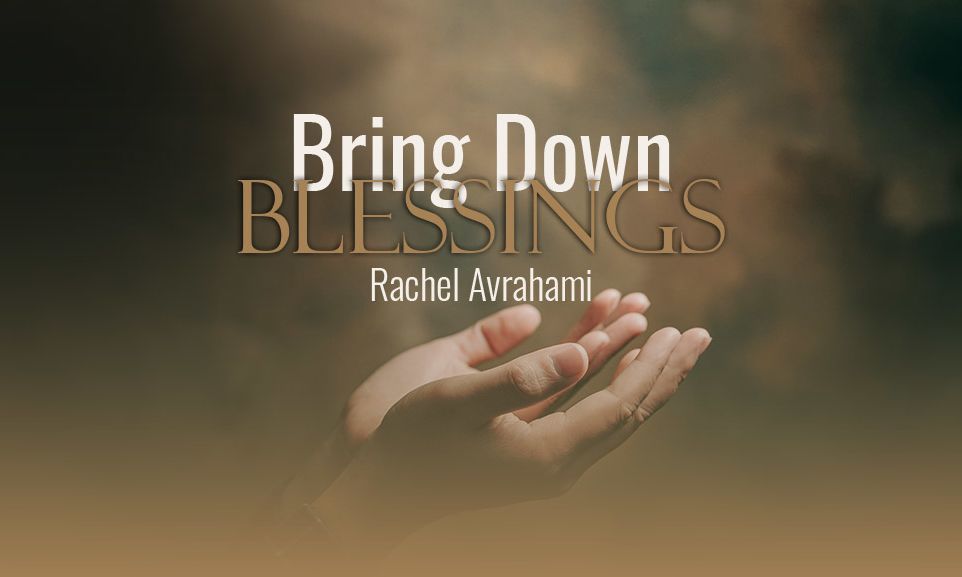
Bring Down Blessings
A powerful secret to bring down all the blessings you've been waiting for!

As Rabbi Arush constantly reminds us, just as Hashem created the natural world with rules and “laws of nature,” so too He created spiritual rules and laws. The Law of Gratitude is one of them. “There is no suffering without sin” is another big one which is explained in depth in The Garden of Emuna. Another important rule that can change your life is explained in Can You Buy Spirituality? Now, I’m going to teach you another rule Rabbi Arush recently discussed, with critical ramifications for anyone who wants to get their prayers answered: Hashem keeps Torah and mitzvot (so to speak) just like us!
Obviously, we’re speaking in an allegory here since Hashem doesn’t have a body in this world. But let’s continue with the powerful example Rabbi Arush used: If, according to Jewish law, a man cannot look at you because of the way you’re dressed – then neither can Hashem. And that means that He cannot hear your prayers!
Jewish law dictates the required modest attire that a woman must be wearing for other men to be allowed to pray in her presence. Outside the house, Jewish law requires a second layer of clothing covering the torso (generally achieved using a jacket, sweater, shawl or vest) and has very strict rules governing the separation of men and women.
Inside the house with only the nuclear family, the rules are greatly relaxed. However, many women forget that Hashem is still around, even inside the house. And we certainly want Hashem’s Shechina (presence) in the house, because there isn’t a vacuum. When Joseph was thrown into the pit, the Torah says that the pit was empty. Rashi says that there were snakes and scorpions there because there is never a vacuum. So, if Hashem isn’t there, then the Other Side of impurity is there. Hashem is good and blessing, so if that leaves – well you can imagine what comes in instead, G-d forbid!
The basic rules of modesty including socks and hair covering are still absolutely required even in the inner recesses of the house, including during sleep. There are various laws about how she must be dressed in order for her husband and close relatives to pray Shema and other blessings. For instance, if her hair is uncovered or if her legs are showing because she isn’t wearing socks, then her husband must turn away in order be able to pray, since he isn’t allowed to see erva (immodesty) and pray.
So, if a woman is dressed in a way that is immodest according to Jewish law, then Hashem cannot look at her either. He also must “turn His back” so to speak, just like her relatives. This means that she loses her Divine protection, and her prayers aren’t heard either!
This has far-reaching ramifications! I’m going to give you just a few off the top of my head:
Nightgowns and robes are problematic because even if they cover the body well, they are generally cut straight which means that they reveal the shape of the body. Depending on the fabric (many robes are stretchy which is also forbidden) and body type, this could become a problem even inside the house. This is even more problematic for many women who don’t realize that it is a severe prohibition to step outside of the house in any form of robe, including “Shabbos robes.” They might walk their children to the bus stop or run to the grocery next door in a robe. During this entire time, they have lost their Divine protection not only for themselves but those around them, including their children – because Hashem isn’t watching and protecting them from accidents and mishaps like a loving father otherwise would!
The real doozy here is wigs (especially real hair wigs which have the din of avoda zara – idol worship – in addition to immodesty) or hair coming out from under a hair covering of any type. All major Ashkenaz and Sephardi poskim (Rabbis who determine Jewish law) hold that wigs are absolutely forbidden. A short list includes: Rabbi Chaim Kanievsky, Rabbi Ovadia Yosef, the Baba Sali, Rabbi Elyashiv, the Chasam Sofer, Rabbi Shach, the Chofetz Chaim, Rabbi Shlomo Zalman Auerbach, the Steipler Gaon, the Chazon Ish, Rabbi Mordechai Sharabi, and the Gaon of Vilna (Gra) zt”l. It’s a list to be reckoned with! These are all the greats of the last few generations, Gedolei Hador that every Jew is supposed to listen to – how does any “Rabbi” not shudder to dare to permit wigs against such giants!
This is my favorite video of Rabbi Ovadia Yosef zt”l (in Hebrew). He lists one after the other the list of everyone who forbids wigs and says, “How can I possibly permit them?” He comments that another giant put anyone who would permit wigs into cherem (excommunication) and exclaims, “It’s terrifying!” In the middle of spewing names left and right of basically every Rabbi that every Orthodox Jew is supposed to listen to, he says, “What, do I have a personal interest in this? Do I sell hats and tichels (head scarfs)?”
He continues and says that sometimes people ask him what to do if the potential husband insists that he only wants a wife who covers her hair with a wig? Should they proceed or not? He answers, “Such a bachur is a rasha, machti harabim! He is wicked and causes others to sin! The Kaf HaChaim rules that it is forbidden to marry such a man! His Torah is worth nothing!” I would like to add that someone who is a machti harabim has no portion in the Next World!
The saddest part of this reality is that many people specifically wear wigs for the most important occasions in their lives, when they want and desperately need Hashem to be there blessing them: weddings, brit, Bar Mitzvah, Shabbat, and much more. Still undecided about hair covering? Read A Spiritual Antenna to help untangle the dilemma.
And here comes Rabbi Arush who tells us that Hashem says, “My precious Jewish daughter, dress modestly so that I can hear your prayers, and I can pour down on you all those blessings you’re praying for!”
***
Rachel Avrahami grew up in Los Angeles, CA, USA in a far-off valley where she was one of only a handful of Jews in a public high school of thousands. She found Hashem in the urban jungle of the university. Rachel was privileged to read one of the first copies of The Garden of Emuna in English, and the rest, as they say, is history. She made Aliyah and immediately began working at Breslev Israel.
Rachel is now the Editor of Breslev Israel’s English website. She welcomes questions, comments, articles, and personal stories to her email: rachel.avrahami@breslev.co.il.








7/18/2023
While that’s an impressive list of the generation’s greats, notably not mentioned here is the Lubavitcher Rebbe’s opinion on wigs. He would tell women to specifically wear a wig and not a scarf.